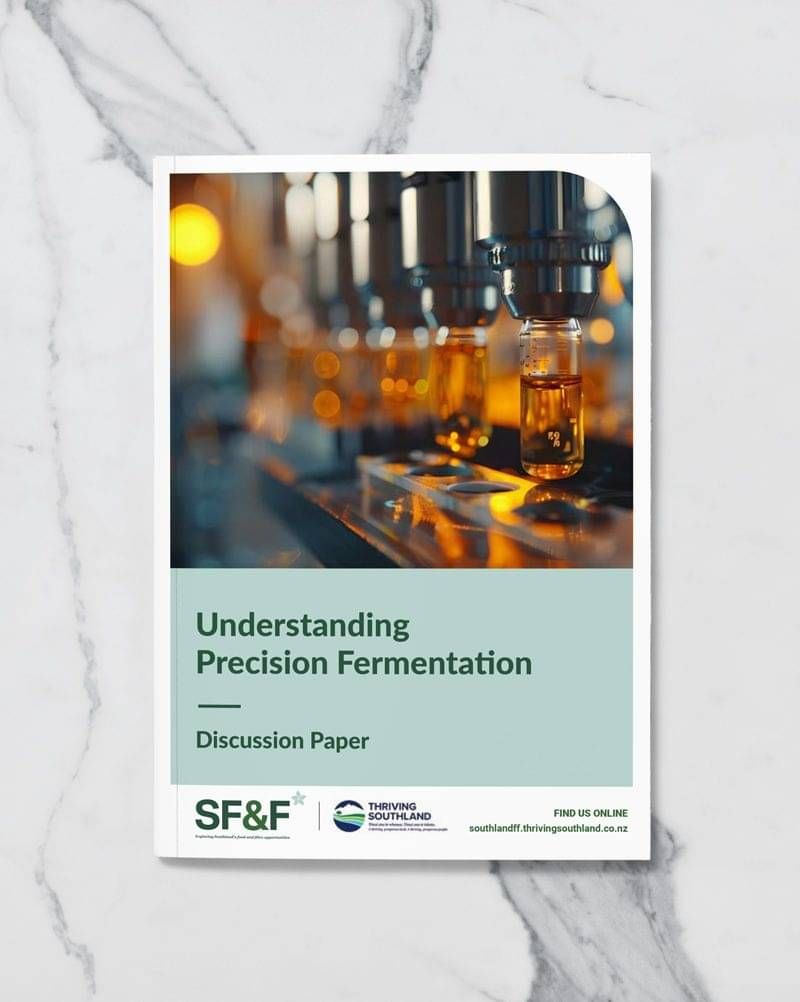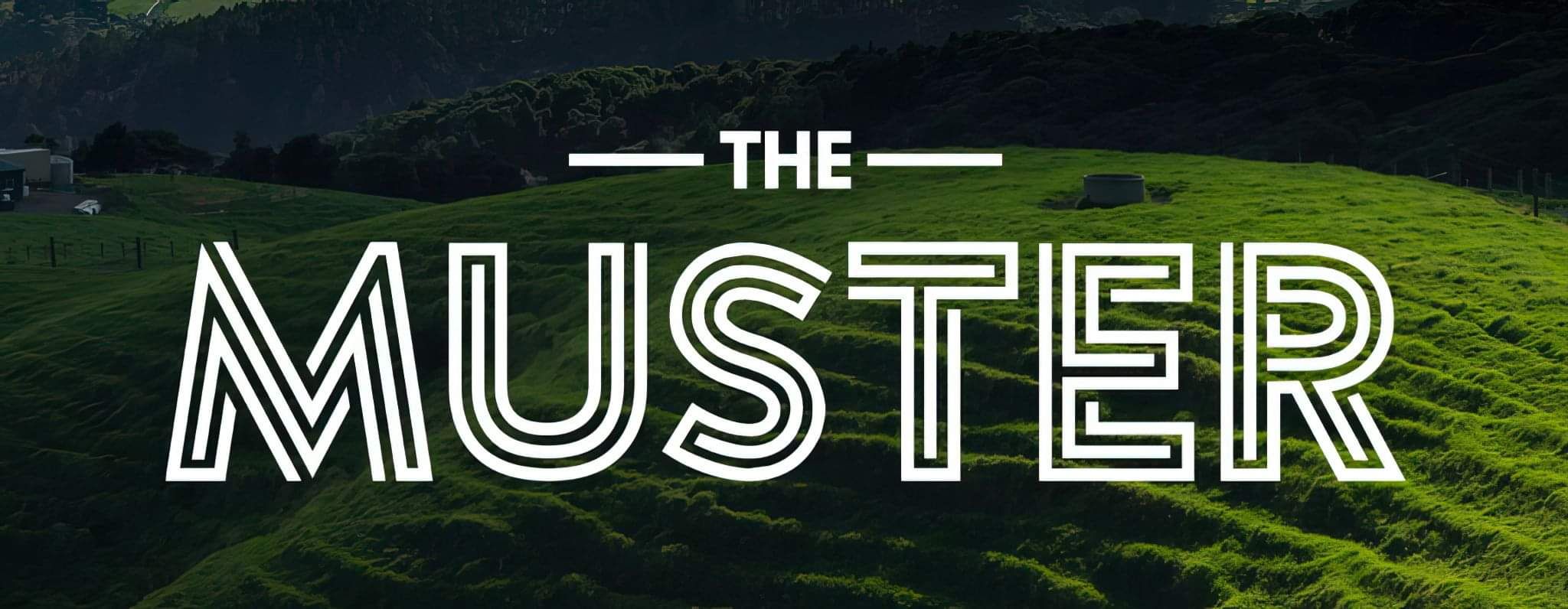Growing a strong regional future
Precision Fermentation:
A Discussion Paper for
Southland Farmers
We're excited to share our new discussion paper on precision fermentation — a key technology with the potential to impact New Zealand's dairy sector. This paper offers a high-level look at precision fermentation, covering the basics, sharing insights from stakeholders, and pointing to further info. It’s designed to spark thought and debate, helping you form your own views on this emerging technology. Have a read, learn more about it, and let's keep the discussion going!

Exploring Southland's food and fibre opportunities
We are on a mission to uncover commercially viable opportunities that will diversify Southland's economy and create new job prospects. If you're part of the food and fibre sector, let's team up to unlock the region's untapped potential.
Project rational
We want to future-proof the region’s food and fibre industry with community ideas. Southland's strength lies in its land, making the food and fibre sector integral to the region's economy. Thriving Southland aims to support landowners with their decision making by providing robust and trusted information resources freely.
Engagement process
Thriving Southland's Stage One engagement process has uncovered exciting possibilities for the region's food and fibre sector. The Project Team conducted workshops, collaborated with stakeholders, and prioritised nine themes: Grains, Legumes & Vegetables, Forage and Feeds, Pastoral Farming, High Value Niche, Forestry, Regional Differentiation, Processing Infrastructure,Waste streams, and Science & Technology. These themes guided an online engagement process to capture diverse insights on potential food and fibre opportunities. The user-friendly online platform was visited by 1967 people and received 80 contributions, shaping the project's direction based on community feedback.
Workshop highlights
In October 2023, the project team held a workshop in Mataura to discuss the contributions, opportunities and issues with farmers and landowners. Discussions revolved around understanding market potential, processing logistics, cost-benefit analysis, and the challenges and opportunities each contribution presented.
Top seven
Following a successful workshop, the Project Advisory Group worked alongside the Project Team to shortlist seven opportunities to progress to Stage Two. The seven opportunities were also prioritised across four tiers, so that funding can be sought via a phased approach. The seven areas of focus include on-farm energy and biomass technology, niche food and fibre enterprise, local markets through food and beverage tourism, industrial hemp, regional processing solutions, industrial food ingredients and precision fermentation.
We are in Stage Two
We're developing blueprints, guidance documents and discussion papers on seven shortlisted opportunities. Stage Two encompasses a range of tasks, including research, writing, design, publication and project management.
Timeline
January - May 2023
MBIE funding approved. Project Team works with key regional stakeholders to identify opportunities within the food and fibre sector that are commercially viable and scalable.
June - August 2023
Online engagement process enabling the general public to submit ideas.
October 2023
Discussion and fine-tuning of contributions with farmers and landowners at Mataura workshop.
November 2023
Project Advisory Group and Project Team prioritise seven opportunities.
January - December 2024
Thriving Southland to identify key organisations and businesses to participate in and contribute to Stage Two work.

LISTEN TO PODCAST EPISODES ON THE MUSTER
Sandra King chats to Andy about the Southland Food and Fibre Project
Anna Crosbie chats to Andy about the launch of an exciting new project that aims to boost Southland's food and fibre sector
Shortlisted Opportunities
Precision Fermentation
Draft a discussion paper to prompt regional awareness of the anticipated impact of precision fermentation on the dairy, sheep and beef industries.
As precision fermentation gains momentum globally, driven by microbial fermentation producing animal-free alternatives to traditional proteins, its disruptive potential in the dairy sector is anticipated within a decade. The Precision Fermentation Alliance, formed in early 2023, reflects the industry's growing influence, with global fermentation companies raising more than US$800M in 2022. Here in New Zealand, major players in the dairy sector are proactively adapting to changing consumer preferences and technological advancements. The discussion paper will be an educational resource that seeks to stimulate debate around the transformative nature of this technology, explore evolving profit dynamics, and identify Southland's preparation strategies, avoiding speculation.
Read the discussion paper HERE
Establishing a Niche Food and Fibre Enterprise
Produce a user-friendly guidance document on establishing niche food and fibre enterprises, offering practical insights for landowners and businesses.
The document will highlight the opportunities and barriers associated with establishing markets for niche products. It will also shed light on issues landowners need to consider before investing in niche crops or products. The guidance document will be developed within a five-year timeframe, and will incorporate five niche grower case studies from Southland and beyond. Niche enterprises not only present opportunities for economic diversification, resilience building and business growth, but are also well-suited to Southland's topography and climate. Targeting landowners, business owners and investors along the value chain, this document will aim to stimulate regional economic benefits.
Regional Processing Solutions
Create a blueprint that identifies key regional food and fibre processing opportunities and barriers, and outlines steps to support the development of individual processing solutions and projects.
This strategic guide addresses the pressing need for localised seed processing infrastructure, milling capabilities, and a versatile Contract for Services processing hub, to promote growth and innovation for niche growers. By reducing reliance on external processing and freight, this initiative safeguards Southland producers from sudden cost fluctuations, and enhances financial stability. This blueprint aims to benefit growers who lack the means to invest in processing facilities. To attract commercial investment, it will explore opportunities for partnership, joint venture and collaborative models of investment. Improved regional processing infrastructure will not only support value-added innovations but also open avenues for new products and markets.
Industrial Food Ingredients Sector
Create a blueprint that identifies opportunities to develop an industrial food ingredients sector in Southland, addressing global demand and sustainable sourcing.
Investing in this initiative is vital due to increasing global demand for high-quality ingredients sought by major food and beverage manufacturers. Conscious consumers pushing for transparent supply chains amplify this need. Global constraints on certain ingredients, like peppermint oil, highlight the sector's potential. With a diverse list of required ingredients, Southland landowners and business owners can specialise in key categories. Scalability depends on market establishment and meeting processing requirements. Different ingredient types need different processing infrastructure, raising considerations about collaboration and centralisation. Initial focus on import substitution and addressing processing constraints will be crucial.
On-Farm Energy and Biomass Technology
Produce a comprehensive guidance document that addresses the growing need for on-farm energy and biomass technologies among farmers and growers.
The aim is to provide up-to-date information, case study examples and practical insights to assist landowners in making informed decisions about investing in on-site technology. This includes technology converting effluent to methane and crop residues to biomass briquettes. The need for this project stems from the evolving landscape of technology and the increasing pressure on farmers to reduce carbon emissions. The document will explore technology viability, costs, benefits and waste stream utilisation. It will also delve into potential regional collaboration for scalability and market development for surplus products.
Developing Local Markets through Food and Beverage Tourism
Create a guidance document that identifies opportunities to develop food andbeverage tourism, outlining steps to support individual food and beverage tourism projects.
Investing in this initiative is crucial as Southland boasts a variety of excellent food and fibre products, and has the potential to offer unique taste experiences coupled with opportunities to meet growers, learn about product provenance, and explore the region's scenery. Developing local markets through food and beverage tourism provides growers with an alternative path to market, particularly small producers seeking to test products and scale-up incrementally.
Industrial Hemp Sector
Create a blueprint that identifies opportunities and challenges in establishing an industrial hemp sector in Southland.
Hemp's versatility, low-maintenance nature and compatibility with existing farming systems make it an appealing option for landowners. However, regulatory constraints and the need for varietal guidance present hurdles to sector development. This blueprint will stress the importance of regulatory changes to facilitate sector growth, addressing processing barriers and market considerations. It will also explore the potential for a robust regional scale, dependent on regulatory updates and investment in processing. While individual landowner plantings can start in the short term, the timescale for regional development hinges on regulatory changes and government support.



